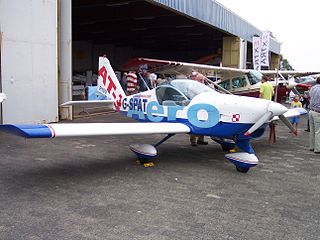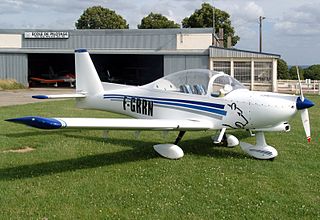
The Aero AT-3 is a two-seat, low wing, utility aircraft manufactured in Poland by Aero AT in ready-to-fly certificated form and as a kitplane. The aircraft is of conventional configuration and features fixed tricycle undercarriage. The structure is largely of all-metal construction. Designed by Tomasz Antoniewski it first flew in 1997 and deliveries to customers commenced in 2002. It is certified under the European Very Light Aircraft regulations. On July 2, 2010 Aero AT-3 was granted an American Federal Aviation Administration type certificate, based on its European VLA certification.

The Gulfstream American GA-7 Cougar is an American all-metal, 4-seat, twin-engined light aircraft. The Cougar was a twin-engine development of the Gulfstream American AA-5B Tiger and traces its lineage to the AA-1 Yankee Clipper and the Bede BD-1.

The Flight Design CT series is a family of high-wing, tricycle undercarriage, two seat, ultralight and light-sport aircraft produced by Flight Design of Germany. The family includes the original CT and the CT2K, CTSW, CTLS and the MC models.

The Grob G109 is a light aircraft developed by Grob Aircraft AG of Mindelheim Mattsies in Germany. It first flew in 1980. The G109B followed in 1984. It is a two-seat self-launching motor glider in which the pilot and passenger or student sit side by side, with good visibility provided by large windows.

The EM-11 Orka (orca) is a touring and executive aircraft manufactured in Poland.

The APM 20 Lionceau is a two-seat very light aircraft manufactured by the French manufacturer Issoire Aviation. Despite its classic appearance, it is entirely built from composite materials, especially carbon fibers.

The SportStar and EuroStar are a family of a two-seat, light sport aircraft (LSA), manufactured by Evektor-Aerotechnik of Czechia and powered by a Rotax 912ULS 100 horsepower (75 kW) engine.

The Pipistrel Virus is a two-seat, single engine light aircraft manufactured by Pipistrel in Slovenia and Italy and sold as an ultralight, homebuilt kit, or light-sport aircraft.

The Stemme S6 is a two-seat touring motorglider manufactured by Stemme AG. Unlike the S10, the S6 has a non-retractable three-bladed propeller, a wider fuselage design, and tricycle landing gear, available both with fixed and retractable configurations. Its engine is a Bombardier-Rotax 914, the same engine used in the Stemme S10-VT. The designers placed great importance on noise and vibration reduction.

The Tecnam P2006T is an Italian high-winged twin-engined all-metal light aircraft, built by Costruzioni Aeronautiche Tecnam based in Capua, Italy, near Naples. The P2006T received airworthiness certification in the European Union by EASA under CS23 in 2003, type certification in 2009, and Federal Aviation Administration FAR Part 23 certification in 2010.

The Breezer is a low-wing, single-engine ultralight aircraft, seating two side by side. Designed and built in Germany, it meets both European and US light-sport aircraft requirements and has been in production since 2001.

The Sling Aircraft Sling 2, formerly called The Airplane Factory Sling 2, is a South African two-seater light aircraft designed and produced by Sling Aircraft in Johannesburg, South Africa. In 2009 the specially modified second prototype was flown around the world in a westerly circumnavigation which took 40 days. This was the first time any aircraft of this class had achieved a circumnavigation. The design complies with the requirements of four different regulatory aircraft classes.

The Tomark Viper SD4 is a Slovak single–engine, all-metal, two-seat low wing monoplane with a fixed tricycle undercarriage and side-by-side seating for two people. The aircraft is built by Tomark s.r.o. of Prešov.

The Aerospool WT9 Dynamic is a Slovak ultralight and light-sport aircraft, designed and produced by Aerospool of Prievidza. The aircraft is supplied as a complete ready-to-fly-aircraft.

The Light Wing AC4 is a Swiss ultralight and light-sport aircraft, designed by Hans Gygax and produced by Light Wing AG of Stans. The aircraft was publicly introduced at the AERO Friedrichshafen show in 2013. It is supplied complete and ready-to-fly.

The Aquila A 211 is a German, two seat side-by-side configuration light aircraft, built by Aquila Aviation.

The Aero East Europe Sila is a family of Serbian ultralight and light aircraft, designed and produced by Aero East Europe of Kraljevo and later of Jagodina, introduced at the AERO Friedrichshafen show in 2013. The design is supplied complete and ready-to-fly.

The Pelegrin Tarragon is a Latvian ultralight aircraft that is produced by Pelegrin Limited of Ādaži, introduced in 2010. The aircraft is supplied complete and ready-to-fly.

The Pipistrel Velis Electro is a Slovenian light aircraft, designed and produced by Pipistrel of Ajdovščina. The aircraft was EASA CS-LSA fully electric type certified in June 2020 and it is intended primarily for the training aircraft role, particularly multiple successive take-off and landings at the airfield. The design is the first type certified electric aircraft and is supplied complete and ready-to-fly.

The Tecnam P-Mentor is an Italian light aircraft, intended for flight training, designed and produced by Tecnam of Casoria. It was introduced in April 2022 and is EASA CS-23 type certified in Europe.






















